Signs & Symptoms Of Autism In Adults


Understanding Autism Spectrum Disorder in Adults
Autism spectrum disorder (ASD) is a neurodevelopmental condition affecting social interaction, communication, and behavior. While often identified in childhood, many adults live with autism, sometimes undiagnosed, facing unique challenges and strengths. Recognizing the signs and symptoms in adults is vital for diagnosis, access to therapies, and improving quality of life. This article explores the diverse manifestations of ASD in adults, diagnostic complexities, and available therapeutic supports.
Recognizing Social and Communication Challenges in Adults with Autism
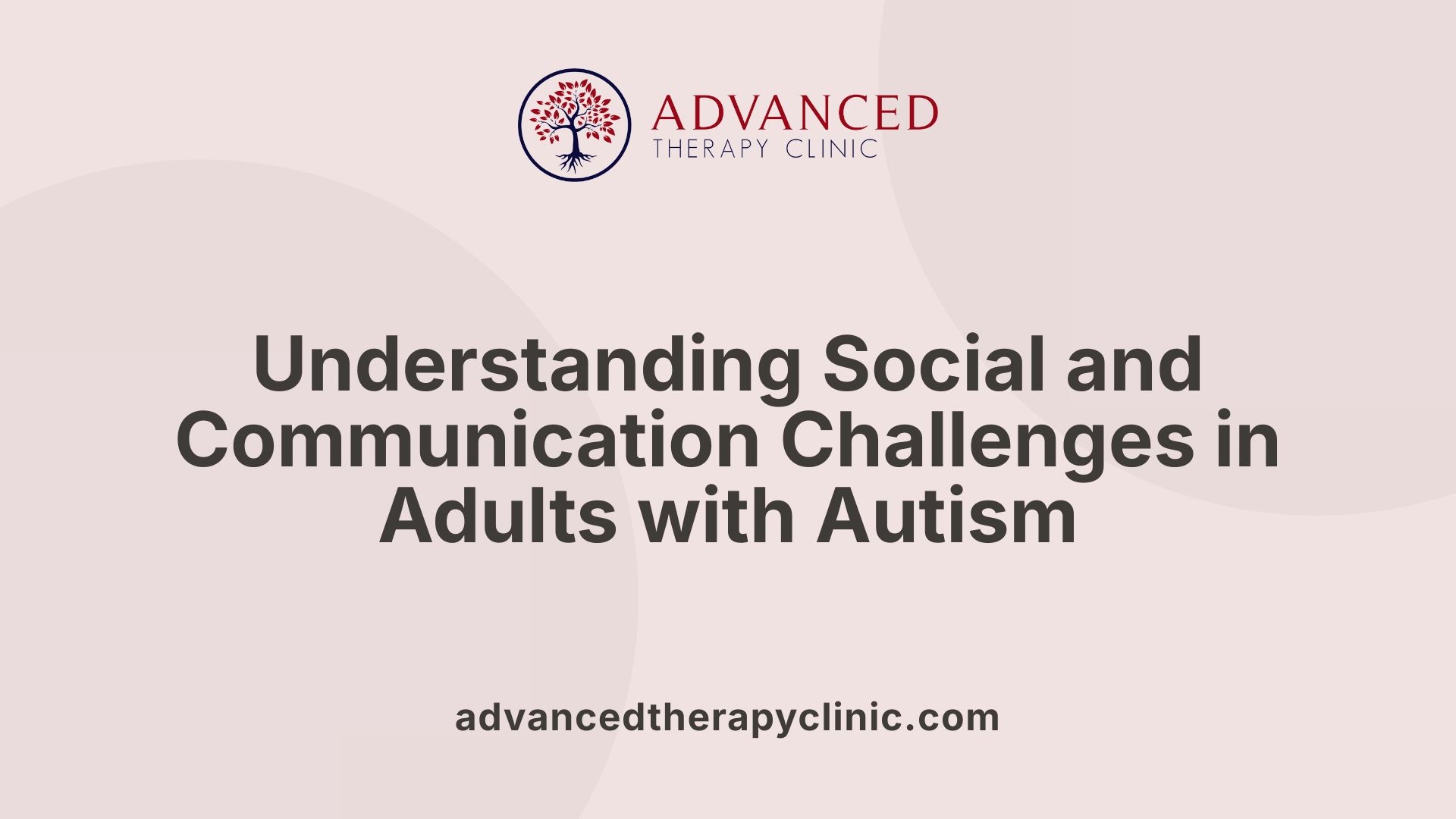
What are common social symptoms of autism in adults?
Adults diagnosed with autism spectrum disorder (ASD) commonly face challenges in social interactions. These difficulties include trouble maintaining conversations and understanding the flow of social exchanges. They may struggle to articulate personal thoughts clearly, which can affect forming close friendships.
Difficulties with nonverbal communication
Interpreting nonverbal cues such as facial expressions, body language, and eye contact often presents significant challenges. Many autistic adults are uncomfortable with eye contact, which can be misinterpreted by others. This discomfort adds to the complexity of social situations.
Social anxiety and its impact
Social anxiety is frequent among autistic adults and contributes to avoidance of social interactions. This anxiety, combined with difficulties in interpreting social norms and responses, can lead to a sense of isolation.
Maintaining conversations
Holding a conversation can be difficult due to challenges in picking up social cues, managing turn-taking, and staying on topic. These challenges sometimes cause autistic individuals to appear blunt or uninterested unintentionally.
Understanding these social and communication difficulties is crucial for developing effective support and therapy strategies for adults with ASD, enabling better social integration and improving quality of life.
Repetitive Behaviors, Sensory Sensitivities, and Executive Function in Autism

What repetitive behaviors and sensory symptoms do autistic adults exhibit?
Autistic adults often display various repetitive behaviors. These can include a strong preference for routines and difficulty adapting to changes. They may engage in self-stimulatory behaviors, such as hand-flapping or rocking, and have specific ways of arranging objects. Intense focus on particular interests or hobbies is also common.
Sensory processing differences are frequently observed in autism. Many adults experience hypersensitivities to sensory stimuli like loud sounds, bright lights, strong smells, or certain textures. These sensitivities can cause discomfort or overstimulation, impacting social experiences and daily life.
Executive function challenges are another important aspect affecting many autistic adults. Difficulties with planning, organization, and self-regulation can make managing daily tasks and social situations more demanding. These challenges inform therapy approaches that focus on improving cognitive skills and adaptive strategies.
Together, repetitive behaviors, sensory sensitivities, and executive function issues shape how autism presents in adults. Understanding these symptoms helps guide personalized therapies, such as sensory integration techniques, behavioral supports, and cognitive interventions that enhance functioning and quality of life.
Diagnostic Complexities of Autism Spectrum Disorder in Adults
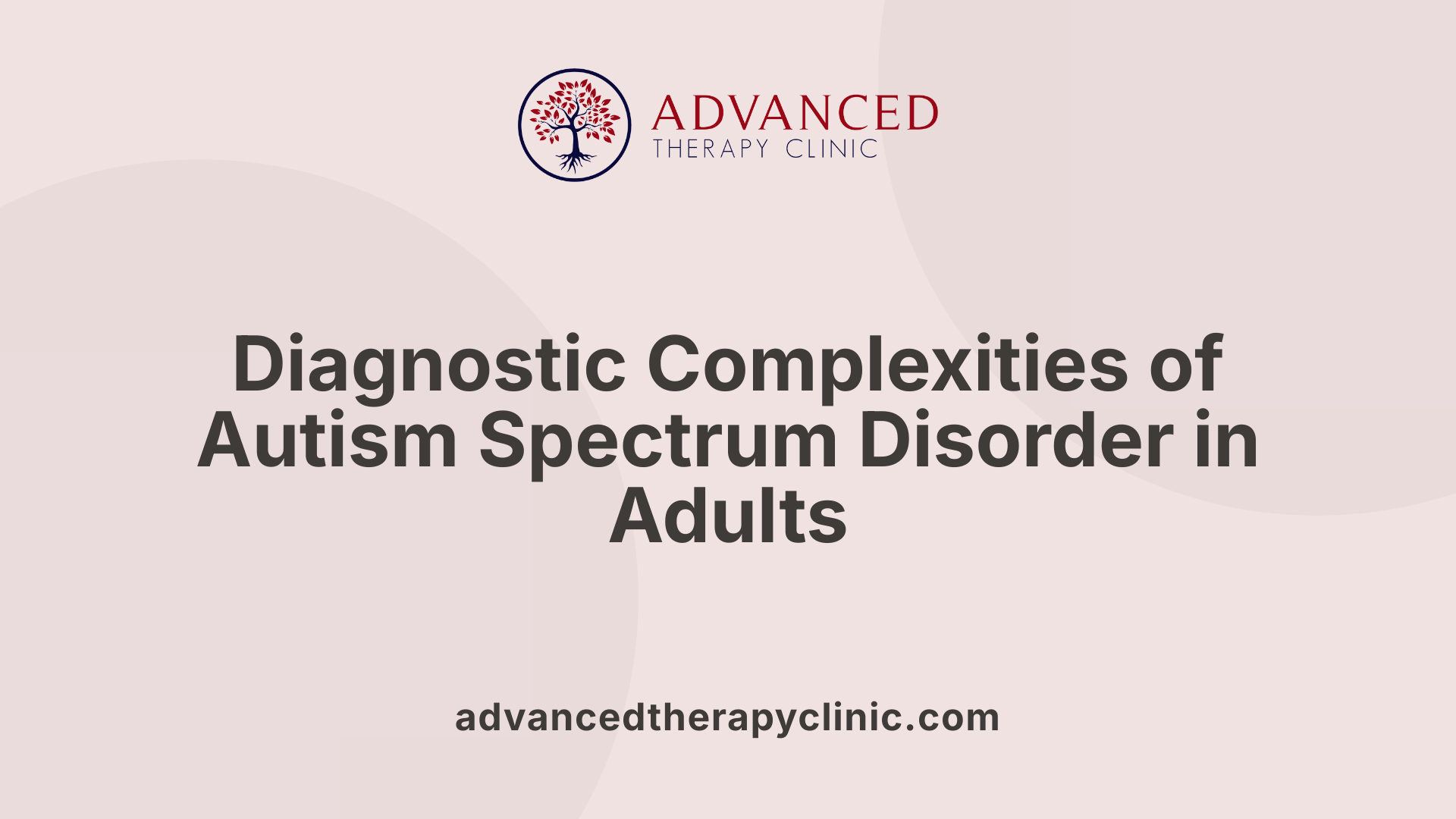
What are the diagnosis challenges in adults?
Diagnosing autism spectrum disorder (ASD) in adults can be particularly challenging because classic childhood symptoms may not always be apparent. Many adults develop learned coping strategies or masking behaviors that obscure traditional signs of ASD. This makes it difficult to rely solely on typical childhood diagnostic criteria.
How do masked symptoms affect diagnosis?
Masked symptoms refer to the subtle or hidden signs of autism that adults may develop to fit in socially. For example, many autistic adults mimic others’ mannerisms or alter their speech patterns to avoid standing out, which can complicate clinical observations. Women with ASD, in particular, often exhibit these masking behaviors more effectively, further complicating accurate detection.
What assessment tools are used, such as ADOS-2 and AQ?
Specialized assessment tools are essential for diagnosing ASD in adults. The Autism Diagnostic Observation Schedule-2 (ADOS-2) is a widely used clinical observation tool that helps evaluate social interaction, communication, and restrictive behaviors in adults. Additionally, the Autism Spectrum Quotient (AQ) is a self-report questionnaire that measures autistic traits, aiding clinicians in understanding an individual’s profile.
How does adult diagnosis differ from childhood diagnosis?
Diagnosis in adults differs from childhood diagnosis because adults often do not display early developmental signs as clearly. Many may show less intense repetitive behaviors but experience increased social anxiety, difficulties in maintaining conversations, or sensory sensitivities. Unlike children, adults’ symptoms are also masked or compensated for by learned behaviors.
Why is developmental history important?
Despite these challenges, gathering detailed developmental history remains critical. Clinicians typically collect information from the adult and, when available, from caregivers to understand early social communication patterns, repetitive behaviors, and sensory issues. This historical context, combined with current assessment, helps confirm diagnosis and differentiate ASD from other mental health conditions.
This nuanced diagnostic process ensures that autistic adults receive an accurate diagnosis and appropriate support tailored to their individual needs.
Co-occurring Conditions and Their Impact on Adult Autism Diagnosis and Therapy
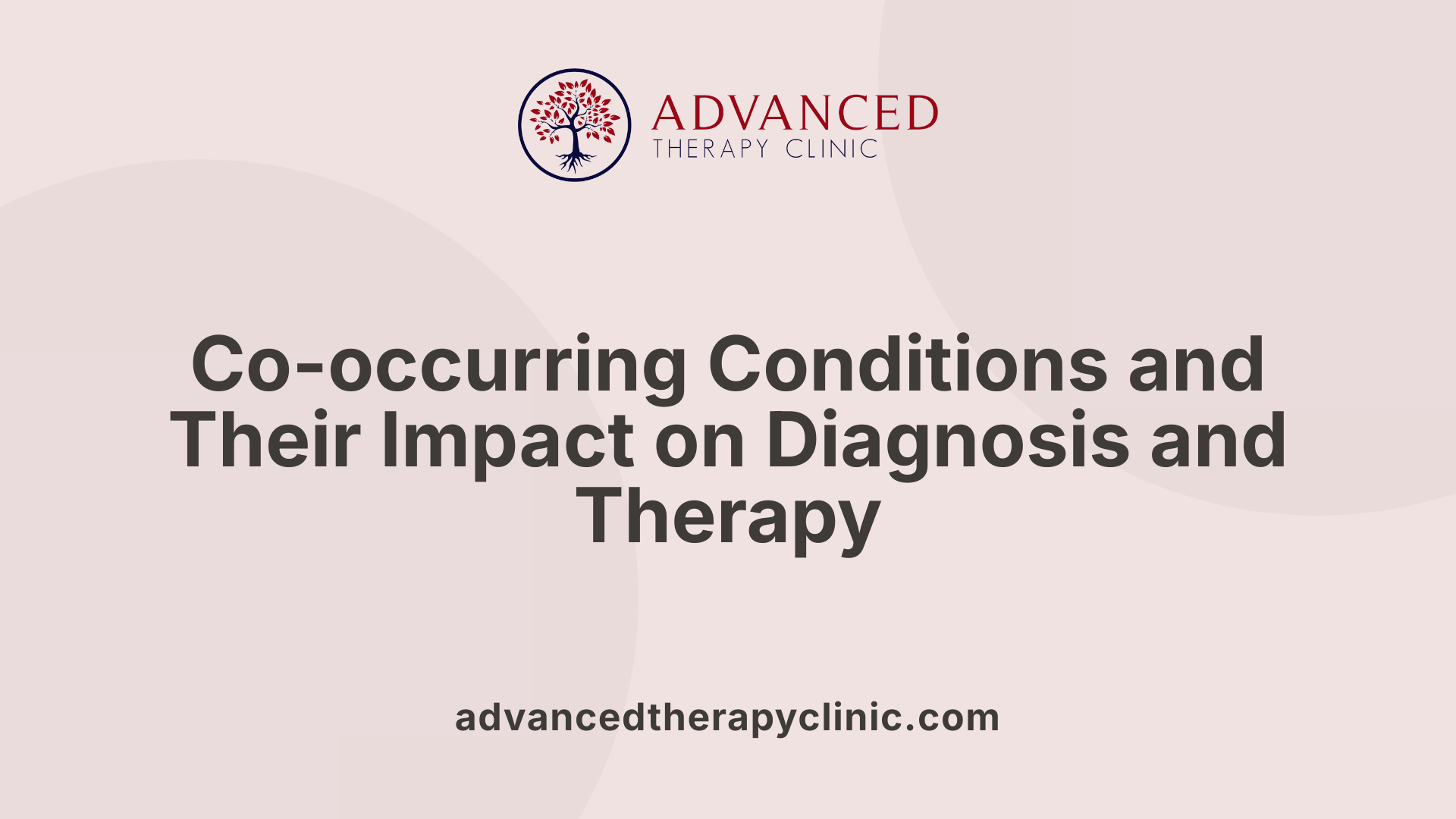
Common Co-Occurring Conditions in Adults with Autism
Adults diagnosed with autism spectrum disorder (ASD) frequently experience additional health challenges alongside their core symptoms. Common co-occurring conditions include attention deficit hyperactivity disorder (ADHD), anxiety disorders, and depression. These conditions often complicate the clinical picture, influencing both diagnosis and treatment strategies.
Gastrointestinal and Epilepsy Concerns
Beyond mental health issues, individuals on the autism spectrum may also contend with physical health problems such as gastrointestinal disorders and epilepsy. These medical concerns require careful management and can significantly affect the individual’s overall well-being and response to therapies.
Implications for Therapy Planning
The presence of co-occurring conditions necessitates a comprehensive approach to therapy. Treatment plans must be carefully tailored to address not only autism-related symptoms but also the additional challenges posed by mental health and medical issues. This often involves interdisciplinary collaboration among specialists, including psychologists, psychiatrists, neurologists, and gastroenterologists.
Therapy may include behavioral and psychological interventions, medication management, and support for executive function difficulties. Special attention to sensory sensitivities and communication challenges remains essential.
Importance of a Holistic Health Approach
Given the complexity of co-occurring conditions, a holistic health approach is fundamental in supporting adults with ASD. Early diagnosis that accounts for these coexisting issues can facilitate access to targeted therapies— such as behavioral interventions, speech and occupational therapies, and counseling— which improve life quality and daily functioning.
This comprehensive care approach ensures that the interplay between autism symptoms and co-occurring conditions is effectively managed, supporting the individual’s social integration and mental and physical health.
Strengths and Abilities of Adults on the Autism Spectrum
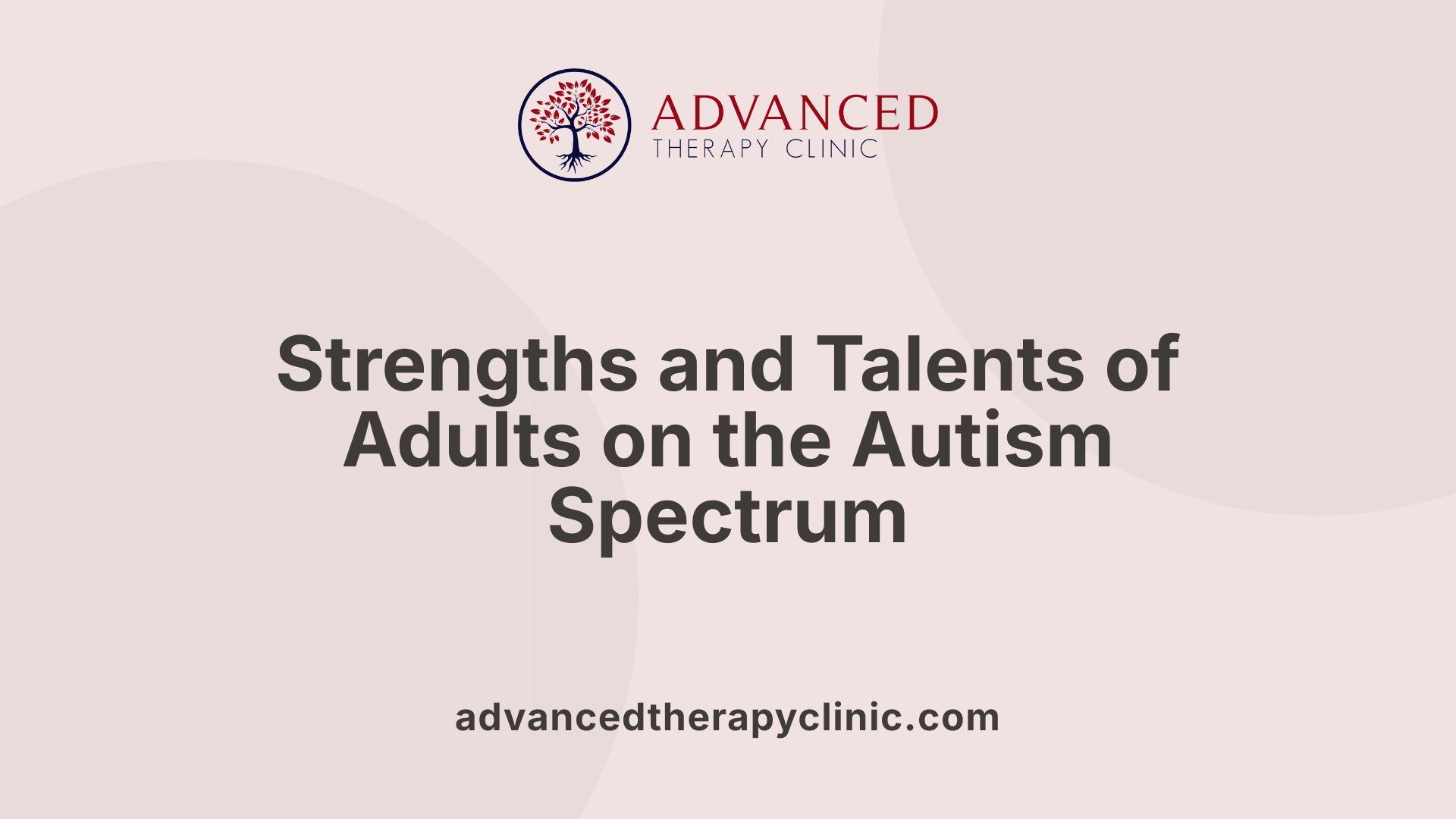
What unique cognitive strengths do adults on the autism spectrum have?
Adults with autism spectrum disorder (ASD) often display remarkable cognitive strengths that contribute positively to their daily lives and work.
Many show excellent memory skills, particularly in recalling details and facts with precision. This ability can be a significant advantage in fields requiring focused attention to detail.
How do visual and auditory learning abilities manifest in autistic adults?
Visual and auditory learning are commonly reported strengths among autistic adults. They may excel at processing and retaining information presented visually or through sound, which enhances their capacity to master skills in specific areas.
What talents are commonly found in adults on the autism spectrum?
Autistic adults frequently exhibit exceptional talents in mathematics, science, art, and music. These abilities often stem from their intense focus and specialized interests, allowing them to develop skills to a high level of expertise.
How does neurodivergence and the spectrum concept relate to strengths?
Understanding ASD as a form of neurodivergence recognizes that autistic individuals process information and experience the world differently, not deficiently. The autism spectrum encompasses a wide range of traits, meaning strengths and challenges vary greatly, highlighting the unique abilities of each adult on the spectrum.
Recognizing and supporting these strengths alongside challenges is essential for effective therapy, education, and employment strategies tailored to autistic adults.
Therapeutic Interventions Available for Adults with Autism
What types of therapies are included under the collective term for therapy-related fields?
The collective term for therapy-related fields refers to a broad spectrum of health and mental health services aimed at supporting adults with autism spectrum disorder (ASD). These include behavioral therapies such as Applied Behavior Analysis (ABA), which helps individuals develop social and life skills through structured and reward-based methods.
Speech therapy assists adults in improving communication abilities, helping them articulate thoughts, interpret nonverbal cues, and engage more effectively in conversations. Occupational therapy supports individuals in managing daily tasks, sensory sensitivities, and executive functioning challenges, focusing on enhancing independence and adaptive skills.
Physical therapy can address motor skills and coordination difficulties that some autistic adults experience. Counseling and psychological therapies, including cognitive-behavioral therapy (CBT) and mindfulness-based therapy, are used to manage anxiety, depression, and social difficulties.
Medication may also be prescribed to manage specific symptoms such as aggression, anxiety, hyperactivity, irritability, and repetitive behaviors, although it is not a cure for ASD itself.
Together, these therapies involve a multidisciplinary approach provided by a range of specialists—psychologists, counselors, speech-language pathologists, occupational and physical therapists, psychiatrists, and behavioral therapists—working collaboratively to tailor interventions to individual needs. This integrated programming enhances social communication, daily functioning, sensory regulation, and mental health among adults with autism.
The Diagnostic Journey: Seeking Assessment and Support as an Adult
How Do Adults Begin the Self-Assessment and Professional Evaluation Process?
Many adults start the diagnostic journey by recognizing persistent social communication challenges, sensory sensitivities, or restrictive interests that interfere with daily life. Self-assessment tools like the Autism Spectrum Quotient (AQ) can provide initial insight, but they are only preliminary steps. Seeking professional evaluation is crucial for an accurate diagnosis and access to support.
What Roles Do Clinicians and Specialists Play in Adult ASD Diagnosis?
Experienced clinicians such as psychologists, psychiatrists, developmental pediatricians, and neurologists conduct thorough assessments. These specialists carefully review developmental history, observe behavior, and consider potential co-occurring conditions. Their expertise helps differentiate autism from other overlapping mental health disorders.
What Diagnostic Criteria Are Used for Adult Autism?
Diagnosis is based on the DSM-5 criteria, which emphasize persistent deficits in social communication and interaction across contexts, alongside at least two types of restricted, repetitive behaviors or interests. Symptoms must cause significant impairment and have appeared during early developmental periods, though they may have been masked.
What Assessment Appointments and Tools Are Involved?
The process often includes multiple appointments involving interviews, cognitive assessments, and standardized tools such as the Autism Diagnostic Observation Schedule (ADOS-2). No single test confirms autism; instead, specialists gather comprehensive data from observations and personal history.
What Are the Benefits of Receiving an Adult Diagnosis?
An official diagnosis opens access to tailored therapies including behavioral interventions, counseling, and community support services. It provides clarity about personal experiences and can facilitate legal protections under laws like the Americans with Disabilities Act (ADA). Furthermore, diagnosis helps individuals and families understand strengths and challenges, improving quality of life and social functioning.
Post-Diagnosis Support and Community Resources for Autistic Adults
Community Programs and Support Groups
Many communities offer programs and support groups designed specifically for autistic adults. These provide opportunities for social connection, peer support, and sharing experiences. Support groups help reduce feelings of isolation and can be a valuable resource for learning new coping strategies.
Social Communication Improvement
Therapies such as social skills training and cognitive-behavioral therapy are frequently available through community centers or private providers. These therapies focus on improving conversation skills, understanding nonverbal cues, and building confidence in social situations.
Managing Sensory Needs
Sensory processing challenges are common among autistic adults. Occupational therapy and sensory integration therapy can help individuals learn strategies to manage sensitivities to sounds, lights, and touch. Community programs may include sensory-friendly environments and workshops to accommodate these needs.
Daily Functioning Enhancement
Support services often include vocational training, life skills coaching, and counseling to enhance daily living and occupational functioning. These programs aim to increase independence, organization, and executive function skills.
Advocacy and Legal Rights
Adults diagnosed with autism benefit from understanding their rights under laws such as the Americans with Disabilities Act (ADA). Advocacy organizations offer education on legal protections, workplace accommodations, and accessing public benefits. They empower autistic individuals to advocate for themselves in educational, employment, and healthcare settings.
Embracing Neurodiversity and Accessible Support for Adults with Autism
Understanding the signs and symptoms of autism in adults is crucial for improving diagnosis rates and tailoring therapeutic interventions that acknowledge individual strengths and challenges. While diagnostic complexities exist, especially due to masked symptoms and the absence of classic childhood signs, specialized assessments and increased awareness are enhancing access to support. Behavioral, speech, occupational, and psychological therapies, combined with community resources, empower adults on the spectrum to lead fulfilling lives. Recognizing autism as a diverse spectrum underscores the importance of personalized care and societal acceptance, enabling autistic adults to thrive within their communities.
References
- Autism Symptoms and Diagnosis in Adults
- Autism Spectrum Disorder - National Institute of Mental Health
- Autism Spectrum Disorder (ASD) Symptoms & Causes
- Autism in adults: Signs, symptoms, and diagnosis
- Clinical Testing and Diagnosis for Autism Spectrum Disorder
- Signs of autism in adults
- Autism diagnosis as an adult
- What Is Autism Spectrum Disorder?
Recent articles

Celebrating Small Wins: How Therapy Helps Kids Build Confidence All Year Long
Learn why small wins in therapy matter, how they boost your child’s confidence, and simple ways families can celebrate progress all year long.

Empowering Missoula Children to Grow With Confidence and Connection
Learn how ABA therapy in Missoula helps children build communication, independence, and confidence through personalized, family‑centered support at Advanced Therapy Clinic.

Compassionate Pediatric Therapy in Butte, Montana
A welcoming place where every child’s potential is celebrated
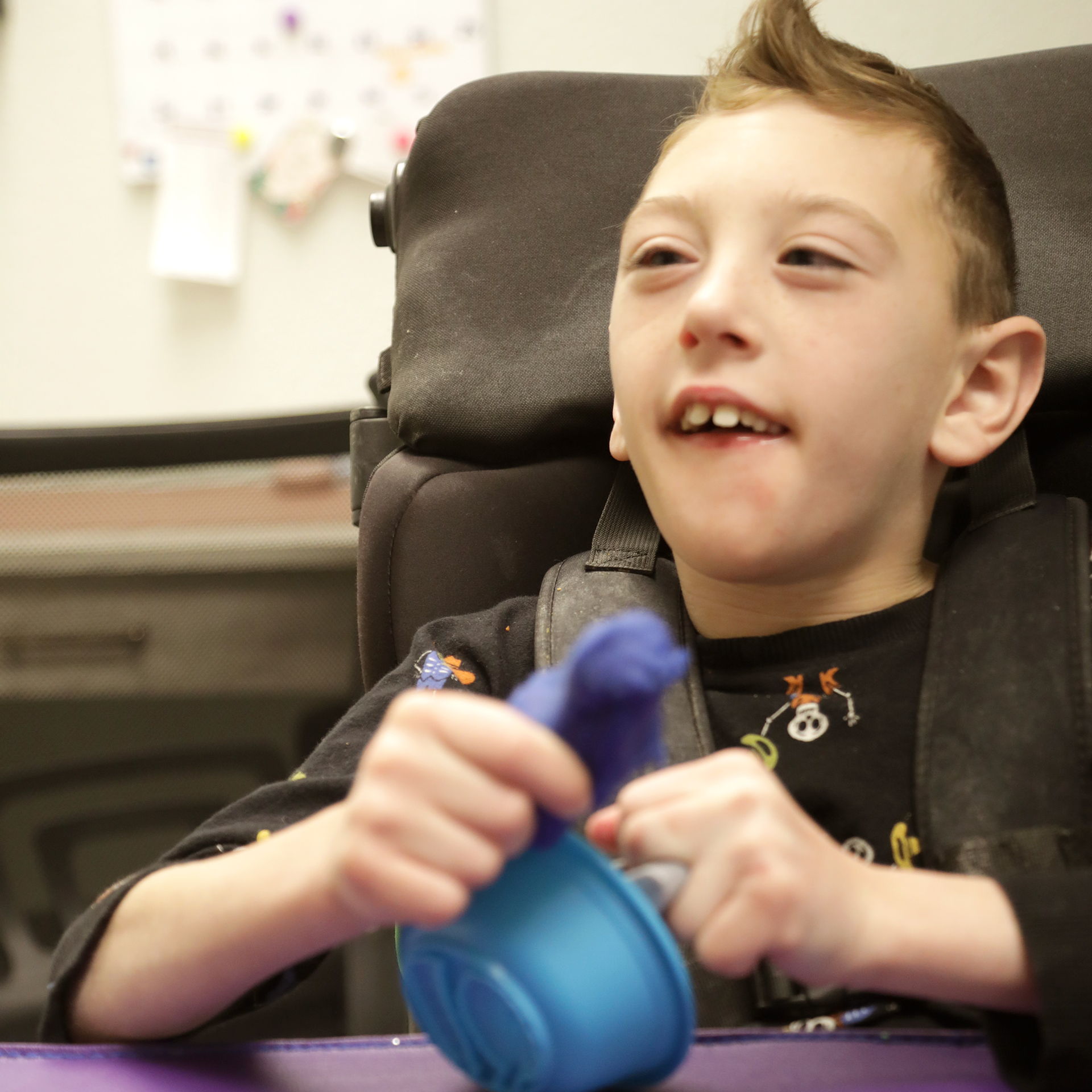
How Pediatric Therapy Helps Kids Thrive across Montana and Wyoming
A supportive guide for families exploring therapy options in Billings, Butte, Missoula or Sheridan.

How to Choose the Right Pediatric Therapy Clinic in Billings, Montana
A Parent‑Friendly Guide To Finding The Best Support For Your Child

Expressive Speech Delay 2-Year-Old
Understanding and Addressing Expressive Speech Delay in Toddlers

